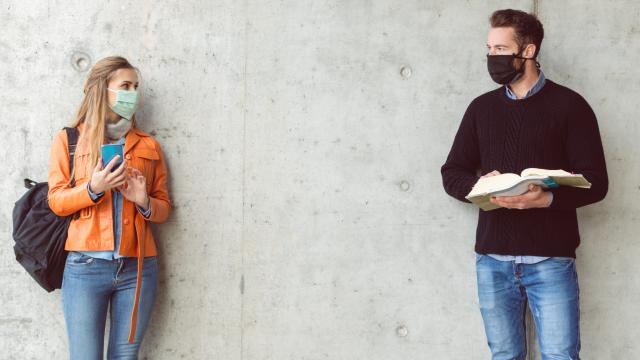We’ve known since close to the start of the pandemic that wearing a mask protects other people from your own respiratory droplets. But shouldn’t masks protect the wearer, as well? The science wasn’t available to answer that question at first, but it’s probably true. The CDC recently updated their mask advice to note that protection seems to go both ways.
They say:
Masks also help reduce inhalation of these droplets by the wearer (“filtration for personal protection”). The community benefit of masking for SARS-CoV-2 control is due to the combination of these effects; individual prevention benefit increases with increasing numbers of people using masks consistently and correctly.
This understanding doesn’t change the bottom line — we should all be wearing masks when we interact with people outside our household — but it helps to understand where the protection comes from.
For example, if you’re headed to a place where you know many other people won’t be wearing a mask, does it matter if you wear one yourself? If masks only protect others from you, you’d be doing a small favour to the other people but not helping yourself. If the new interpretation is correct, though, wearing a mask in that situation probably does help to protect you.
So what changed?
First, scientists have been studying the specifics of how masks work, including how droplets behave when they encounter different types of mask material. Droplets can stick to fibres, be repelled by them, or be caught between them. Even small particles can be caught by the masks. (There’s a great visualisation of how this works at the New York Times.) This supports the idea that masks help no matter which side the virus-laden particles are coming from.
The other line of evidence is a series of case studies: places where you’d expect more transmission of the virus, but since mask wearing was common, the transmission rate was particularly low. These studies included hairstylists who worked while symptomatic, and an outbreak aboard an aircraft carrier. From this type of study, we can’t be sure how much of the protection came from the wearer’s mask versus everybody else’s masks, but it adds to our understanding that more masks make for a safer environment.
The bottom line is that masks work, even though they’re not perfect. N95s work better than cloth masks, but many cloth masks are still very effective, depending on their design. (More layers and higher thread counts seem to make for a more protective mask.) So wear your mask, even if others are not; it will still help.

Leave a Reply
You must be logged in to post a comment.